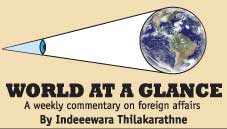|

Pakistan plane crash victims mourned
Pakistan has begun mourning the victims of a plane crash in a
residential area near Islamabad international airport.
All 127 people on board the Bhoja Air jet, flight BHO-213 from
Karachi to Islamabad, are believed to have died.
Rescue workers suspended their search of the wreckage in the village
of Hussain Abad overnight. No casualties have so far been found.
Officials say the Boeing 737's cockpit flight recorder has been
recovered and would be handed to investigators.
The plane, believed to be carrying 121 passengers and six crew, was
making its final approach to the airport when the crash happened. There
are reports of thunderstorms at the time.
The grieving relatives of those on board have been gathering at
Karachi and Islamabad airports awaiting news.
At Islamabad airport, one man yelled "my two daughters are dead",
before slumping to the floor in a state of shock.
The uncle of the sisters, aged 18 and 20, said: "We don't even know
when or where we will get to see their bodies."
Another woman at the airport was desperately trying to find out if
her husband was on the flight.
April showers on the euro
The euro crisis is back, and resolving it is not getting any easier.
Like Brussels, with its fickle weather, the euro crisis enjoyed a
hint of summer but has now returned to wintry gloom. The sun shone after
the European Central Bank took action to avert a credit crunch. Now the
storm clouds are blowing in from Spain. Yields on Spanish bonds are
rising dangerously, and Italian ones are close behind. Like Spain, Italy
will miss its deficit target this year and next. Portugal may also need
fresh support.
For Eurocrats, these are but passing squalls. Summer will come, they
say, so long as everybody sticks to the plans for deficit reduction.
Spain is on track, insists Jean-Claude Juncker, head of the euro group
of finance ministers. The IMF this week revised up its growth
projections: the euro zone's recession this year will be milder than it
previously thought. So why the renewed panic?
One reason is that markets are shifting their concern from deficits
to growth. They fear that budget cuts are pushing countries ever deeper
into recession. Investors may be as fickle as the weather, but the IMF,
too, is warning against over-zealous austerity. Another reason is
political mismanagement. The Spanish government delayed its budget for
2012 because of an election in Andalusia, created suspicions about the
accuracy of its statistics, was cack-handed in its negotiation with the
EU over a revised deficit target and messed up a bond sale just before
Easter.
The EU is more worried about its own credibility. Its new system of
economic governance to impose fiscal discipline is coming into force. It
cannot just look the other way when Spain wildly misses its target (with
a deficit of 8.5% of GDP in 2011 instead of 6%).
A compromise has given Spain a looser target this year, while keeping
the objective of cutting the deficit to 3% of GDP next year. But that
looks unachievable. The EU thinks sticking to targets is essential to
restoring market confidence. Yet stubbornly chasing an implausible
objective may also sap credibility.
Beyond such economic worries, there is renewed political uncertainty.
The election in Greece on May 6th is unpredictable, and a strong showing
by anti-austerity parties could cast doubt on Greeks' commitment to
reforms. Even more important is the French presidential election, in
which the rhetoric of both leading candidates may be a harbinger of
fresh EU turmoil.
Most Eurocrats had thought that the re-election of Nicolas Sarkozy,
difficult as he may be, was preferable to the election of his
challenger, François Hollande. The Socialist front-runner wants to
renegotiate the euro's fiscal compact. Few think the compact will solve
the crisis, but at least it preserves German support and provides cover
for the ECB to keep providing liquidity.
The ECB has issued €1 trillion ($1.3 trillion) of cheap loans to
banks which, in turn, have bought high-yielding bonds from troubled
countries. This Sarkozy trade, as it is sometimes known in the markets,
was an indirect (if inefficient) means for the ECB to support
sovereigns.
Explore our interactive guide to Europe's troubled economies Yet as
the election has neared, Mr Sarkozy has switched from saviour to scourge
of the EU and the euro, talking of reimposing border controls and trade
protection and, most recently and most distressingly, leading an assault
on the ECB's hallowed independence.
He has demanded that it focus on promoting growth as well as fighting
inflation, and that it devalue the currency to boost exports.
This is a breach of last year's pact of silence, in which European
leaders stopped exerting public pressure on the ECB. Mr Sarkozy may have
delighted in leading the EU with the German chancellor, Angela Merkel.
But he now talks wistfully of Charles de Gaulle's 1965 "empty chair"
boycott of European institutions. This may just be electioneering, but
if the ECB is called upon to help once again, it may be less obliging.
|

